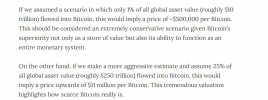Does anyone deny that a monetary premium has developed where a whole host of other assets are concerned as a direct result of monetary policy over the past decade or more?
I think about this a bit. So the economic theory driving monetary policy seems to be that you don't want people to have savings, instead you encourage people to invest instead of save by having inflation devalue savings. This seems to assume that investment is generally productive, or in other words that there is sufficient useful stuff to invest all that capital in, and you also end up at kind of "infinite growth" narrative that modern society is based on. Always borrowing from tomorrow with the assumption that tomorrow's growth will cover what we're spending today.
So I ask myself what if this is too hopeful a premise? What would it look like if the growth isn't there? What symptoms would we see if there's too much capital? I imagine one of the first symptoms would be that stable profitable businesses see their PE ratio increase as there is more money chasing those businesses than before. Here's the data on the S&P 500:
https://www.gurufocus.com/economic_indicators/57/pe-ratio-ttm-for-the-sp-500 . It's been pretty high the last couple of decades compared to historically.
What *should happen* is that the businesses can harness the high share prices to grow their businesses, but we're imaging a scenario where this isn't possible, so what would happen then. Some would actually try to grow the business, but fail to do so which keeps the PE ratio high. Others with too much cash and no idea of how to use it productively might return it to investors by buying back shares or keeping it in a treasury (see: Apple).
As the PE ratios of successful businesses rise the risk to reward ratio diminishes - they become worse value - so it becomes an increasingly less attractive option so money is diverted to other things instead. If profitable companies seem overpriced what do you do? One option is to instead throw money at startups via venture capital, and an increase in this would lead to both more startup funding, and funding of riskier startups that may not even have any roadmap for profit yet.
Alternatively you could decide to avoid the stock market altogether since it seems bad value and perhaps then due to crash. You could go with bonds but again if there's too much money chasing bonds the bond issuers can sell them at a low enough rate that you're back to the same problem of savings where you're losing real value to inflation.
Another alternative then is other assets, anything that you can think of that might act as a better store of value than savings or bonds to some degree - real estate, collectables, art, gold, bitcoin etc. Excess money flowing into these would mean they increase at a rate higher than inflation.
Seems to me like all of this has been happening.
